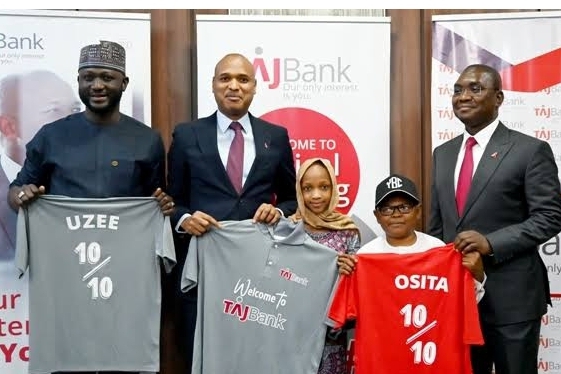L-R: TAJBank’s Managing Director, Hamid Joda, Brand Ambassador, Osita Iheme and the bank’s Executive Director, Mr. Sherif Idi; during the unveiling of the Bank’s Ambassadors and Influencers in Abuja
TAJBank Limited, Nigeria’s foremost non-interest bank, has announced Nollywood acts, Osita Iheme (Pawpaw) and Saratu Daso as brand ambassadors.
According to a statement the bank’s Chief Executive Officer, Hamid Joda in Abuja on Friday, the idea is a marketing strategy to popularise TAJBank’s techno-powered innovative products and services in the grassroots.
Hamid said that it would also deepen financial inclusion in the country.
He also listed Uzee Usman, Aisha Falke (Northern Hibiscus) and Hauwa Jalilah as brand influencers of the bank.
He said that the emergence of the ambassadors and influencers followed a rigorous selection process by a brand expert team constituted by the management.
According to him, the initiative was based on the customer-oriented business philosophy of TAJBank.
“It is also aimed at leveraging the brand ambassadors and influencers’ selfless services and commitment to poverty alleviation in the grassroots,” he said.
He said it will take the TAJBank customer-focused services story to millions of under-served and unbanked people across the country.
He described the event as epochal in the bank’s efforts to tell Nigerians and the global community that TAJBank was determined to serve them better by bringing joy to as many as are ready to bank with it.
“As you can see, these brand ambassadors and influencers have carved a niche for themselves as highly responsible players in the movie industry over the years.
“By their actions, they are people-oriented and socially responsible, especially through their financial and other supports to the needy in the society.
“This aligns with the corporate philosophy of TAJBank, which is to care for the needy through interest-free innovative products and services.
“So, as our partners in the brand and marketing drive for TAJBank, we are optimistic that millions of customers, who are our only interest, will immeasurably benefit from this partnership,” he said.
In a remarks on behalf of the ambassadors, Iheme said that he was proud to be part of TAJBank”s commitment to poverty alleviation in the country.
“I am taking the TAJBank brand to anywhere I go from now, and I will tell the people that TAJBank is the bank to bank with because it cares for all,” he said.
Also, Aisha Falke, who is one of the newly announced influencers, said that she was proud to have emerged as one TAJBank’s influencers.
“ Let me assure the management that I will do my best to take the bank’s mantra, which is “our only interest is you, the customer” to my followers and admirers both locally and internationally.
“TAJBank is a futuristic and innovative non-interest bank that can stand by its customers through thick and thin and offer them the best services at no interest charged.
“The bank’s message is clear – innovative service at no pains – and I am ready to take this to everywhere I go”, she said.










